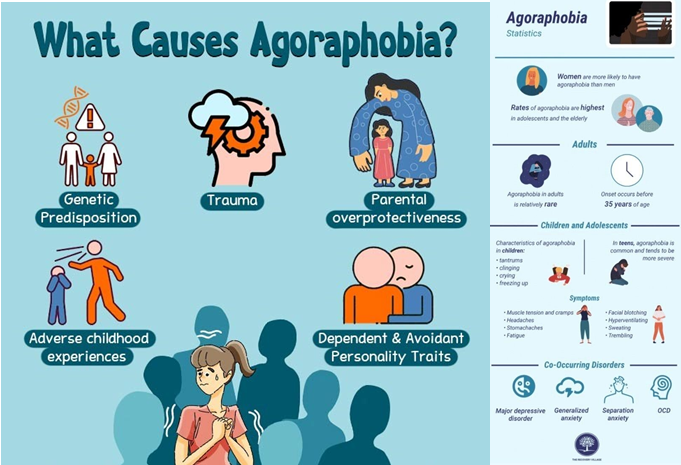A new client is diagnosed with agoraphobia. Which of the following would the healthcare identify as a characteristic of this disorder?
Select one:
Fear Of using public transportation
Avoids interacting with strangers and speaking in public
Avoids being in the presence of spiders
Refuses to use a public restroom because Of the virus, fungus, and bacteria
The Correct Answer is A
Agoraphobia is an anxiety disorder characterized by the fear or avoidance of situations or places where escape might be difficult or help may not be available in the event of a panic attack or other distressing symptom. Individuals with agoraphobia may have intense anxiety or panic symptoms in places such as crowded areas, enclosed spaces, public transportation, open spaces, or places far away from home.
Option b refers to social anxiety disorder.
Option c refers to specific phobia.
Option d refers to obsessive-compulsive disorder.

Nursing Test Bank
Naxlex Comprehensive Predictor Exams
Related Questions
Correct Answer is D
Explanation
In this scenario, the client has expressed a serious threat to harm someone, which triggers a healthcare provider's duty to warn law. The nurse appropriately informed the healthcare provider, who then informed their boss, to protect the potential victim from harm. This action is not a violation of privacy or confidentiality, as it is necessary for the safety and wellbeing of others.
Therefore, no disciplinary action is required for the nurse or the healthcare provider, as they acted in accordance with their professional and legal obligations to protect the safety of others.
Correct Answer is A
Explanation
Chronic anxiety is a persistent feeling of unease, worry, or fear that can interfere with daily life. To manage chronic anxiety, the client needs to identify anxiety-producing situations that trigger their symptoms. This can help the client avoid or cope better with these situations. It is important to note that it is not always possible to eliminate stress and anxiety from daily life, so it is better to focus on managing it effectively.
Trying to repress feelings of anxiety is not a helpful strategy and can make the client's symptoms worse in the long run. Repressing emotions can lead to feelings of frustration, irritability, and even physical symptoms such as headaches or muscle tension.
Contacting the crisis counselor once a week may be helpful for some clients, but it is not a standard recommendation for all clients with chronic anxiety. The discharge plan should include personalized recommendations that are tailored to the client's specific needs and circumstances.

Whether you are a student looking to ace your exams or a practicing nurse seeking to enhance your expertise , our nursing education contents will empower you with the confidence and competence to make a difference in the lives of patients and become a respected leader in the healthcare field.
Visit Naxlex, invest in your future and unlock endless possibilities with our unparalleled nursing education contents today
Report Wrong Answer on the Current Question
Do you disagree with the answer? If yes, what is your expected answer? Explain.
Kindly be descriptive with the issue you are facing.
